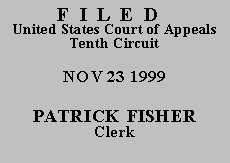

| RODNEY SAMPSON,
v.
JOHN MIDDLETON |
No. 99-6195
(D.C. No. CV-98-945-T) |
Following a bench trial in the District Court of Oklahoma County, Sampson was convicted of trafficking in cocaine base and possession of marijuana. On direct appeal to the Oklahoma Court of Criminal Appeals, Sampson raised various claims of error, including failure to suppress evidence obtained during an unconstitutional search and seizure. Police seized the evidence at issue from Sampson in the Oklahoma City bus terminal. After entering the terminal, Sampson had placed his luggage at his feet and his jacket on the chair next to him. A police officer made a sweep of the station with a trained dog. The dog indicated the presence of narcotics after sniffing Sampson's luggage and jacket. The police then conducted a consensual search of the luggage and a nonconsensual search of his person. The Court of Criminal Appeals held that the search was constitutional. Sampson then filed the present petition in the United States District Court for the Western District of Oklahoma. The district court denied habeas relief, finding that Sampson was afforded a full and fair opportunity to litigate his Fourth Amendment claim in state court.
"[W]here the State has provided an opportunity for full and fair litigation of a Fourth Amendment claim, a state prisoner may not be granted federal habeas corpus relief on the ground that evidence obtained in an unconstitutional search or seizure was introduced at his trial." Stone v. Powell, 428 U.S. 465, 494
(1976); see also Smallwood v. Gibson, 191 F.3d 1257, 1265 (10th Cir. 1999). Sampson does not contend that the proceedings in state court were deficient. Rather he contends that the Stone bar does not apply because the Oklahoma courts "wilfully refuse[d] to apply the correct and controlling constitutional standards." Gamble v. Oklahoma, 583 F.2d 1161, 1165 (10th Cir. 1978). In particular, he cites United States v. Place, 462 U.S. 696, 707 (1983), which held that exposure of luggage located in a public place to a trained canine is not a search within the meaning of the Fourth Amendment. See also United States v. Garcia, 42 F.3d 604, 606 (10th Cir. 1994) (holding that a canine sniff of luggage in a train baggage car does not constitute a search). Contrary to Sampson's assertions, Place does not require reasonable suspicion prior to a dog sniff in this context. See United States v. Morales-Zamora, 914 F.2d 200, 204-05 (10th Cir. 1990).
The Oklahoma Criminal Court of Appeals did not wilfully refuse to apply Place; it cited the case in its summary opinion. See Sampson v. Oklahoma, No. F-96-1185, slip op. at 2 n.1 (Okla. Crim. App. Sept. 11, 1997). Furthermore, nothing in the record indicates that the court applied Place improperly or in a manner contrary to controlling constitutional standards in reaching its conclusion. Therefore, Sampson has failed to demonstrate that he was denied a full and fair opportunity to litigate his Fourth Amendment claim in state court and he has failed to make a substantial showing of the denial of a constitutional right. Petitioner's motion to proceed in forma pauperis is GRANTED; the application for a certificate of appealability is DENIED; and this matter is DISMISSED.
The mandate shall issue forthwith.
ENTERED FOR THE COURT
Carlos F. Lucero
Circuit Judge
*.The case is unanimously ordered submitted without oral argument pursuant to Fed. R. App. P. 34(a)(2) and 10th Cir. R. 34.1(G). This order and judgment is not binding precedent, except under the doctrines of law of the case, res judicata, and collateral estoppel. The court generally disfavors the citation of orders and judgments; nevertheless, an order and judgment may be cited under the terms and conditions of 10th Cir. R. 36.3.